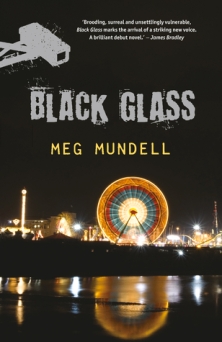This is a dystopian novel set in Melbourne which I thought was such a great idea. There are so many dystopian stories set in the States or in totally invented worlds, so it was really nice to read something Aussie, that included great descriptions of the drought-infested north of Victoria, as well as the ‘casino district’ on the Yarra in the city, and the devastation of the Docklands precinct which (unsurprisingly, perhaps) becomes abandoned and derelict.
The main protagonists are two sisters, Tally and Grace, who get separated at the beginning at novel after their father dies, and each make their way to Melbourne in search of the other. Tally ends up a street kid who does odd jobs for a local racketeer, Grace ends up an actress in magic show in the shabbier part of town. In this way the story isn’t a ‘girl saves the world’ narrative like many other popular dystopian novels featuring female protagonists: it’s more intimate, more ordinary. Which I liked. It was just two girls trying to make it in a tough world and maybe find each other if they manage to survive.
The narrative splits between a bunch of other characters too, the most interesting being Milk, a dude whose job it is to manipulate crowds by altering the sensory environment. That is, he works at large scale events (such a rock concerts, night clubs, sports events, casinos) and affects the lights, scents, temperature, music, and general feeling of the room to get people to do whatever the venue owner wants, whether it’s spend more money, not get involved in fights, make better business deals, etc. Milk is likeable even though his job is ethically questionable, which is why I found his story line interesting. Mundell does a great job of detailing all the different scents and moods etc that Milk effects, which makes his role and function as a symbol of the surveillance state really compelling.
I think the book would have been stronger had all the different themes been woven together more clearly and effectively. There were so many competing ideas, but many of them didn’t seem to be elaborated within the story enough to actually become meaningful. For example, the idea of surveillance was flagged early on as a theme – there are frequent mention of security cameras; the book cover has a camera on it, etc. But we’re never really told what the government is trying to monitor; there’s some suggestion through another set of characters that it’s the establishment’s attempt to rid the city of ‘undocs’ (those with no identification papers), but there’s not enough momentum in those sections of text to ever really make the government feel particularly sinister. It was as though the ‘government’ was meant to be a threatening presence hovering over the specifics of the storyline, but it was so absent that I wasn’t really convinced. Even had it been there, it barely intersected with the storylines of Tally and Grace. So it was hard to feel invested in the theme of surveillance. Milk’s character was great but again, he wasn’t intertwined enough with the theme for me to really see the connection. So by the end of the novel when references to ‘ID-Net’ start being made (I think it’s supposed be a global surveillance initiative though it’s never really specified) I didn’t really buy it – not because the idea of global surveillance isn’t interesting but because it was under-elaborated and so felt insignificant and a bit tacked on.
In fact several of the world-building elements seemed there for the sake of it – for example there’s a weird sexualised blood-letting racket going on (which is a super interesting and creepy idea, by the way) but I never really got how it actually linked it with the surveillance and undoc stuff.
The impression I got is that the novel was a little undercooked in terms of character development and some of the overarching ideas. At the level of sentence, the writing is lovely – tight, evocative, a good balance of action and description (Mundell’s other work is also great like this). But on the whole I felt as though I wasn’t investing in everything that much – I think a longer novel might have been better as there would have been space to detail all the connections and really create the sinister mood I feel the book was aiming for. All that said, I liked the novel – especially if you’re a Melbournian, I think you’ll appreciate it.

Pingback: Childrens and Young Adults: Round Up Three – 2016 | Australian Women Writers Challenge Blog
Pingback: May Round-up of Speculative Fiction Reviews | Australian Women Writers Challenge Blog
Pingback: Spec Fic Focus on Dystopian and (Post-) Apocalyptic Fiction | Australian Women Writers Challenge Blog